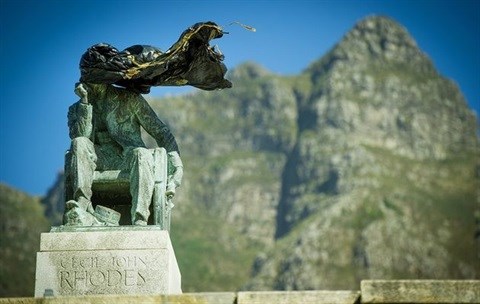The elements of our brand identity or brand essence are still in the making. A brand truth at its core has an emotional appeal, which connects people over time.
Brand theorist Douglas B Holt writes in How Brands Become Icons that brand equity is built when there is a consistent association of timeless concepts with the brand and once this has been determined, "the interpretation of its past efforts and direction into the future is a simple matter."
This said, the campaign has revealed deep divisions in South African society as the sentiment veered sharply between #RhodesMustFall and "#RhodesMustStay." The campaign driven by students has seen the statue being removed from the University of Cape Town.
The supporters have said that the #RhodesMustFall movement is not just about statues but actually an issue that should have been debated and resolved earlier within our 21 years of democracy. What is South Africa's brand truth? What symbols represent the character of our country? Which of the many people who have shaped our vibrant history and heritage should be honoured and celebrated? Should symbols of our country's brutal past continue to occupy pride of place or should they be preserved in museums as warnings to never tread that path again? The best responses to these questions will have at their core, fact and emotion. And when we have an answer that responds to the diverse collective that is referred to as the South African nation, we will have our brand truth.

There are a host of clichés about the dangers of forgetting the past or of celebrating the present without context. This includes one by George Santayana who said: "Those who cannot remember the past are condemned to repeat it." As brutal as our history has been, and while this may "just be a story" for generations of the present and the future, I am not of the view that ignoring it will help us build a South Africa that is representative of all our people in all of our hues. At its most simplistic, this is what apartheid and colonialism sought to do - write out the history and culture of the peoples the colonialists found when they encountered "new" lands. Today Kingdoms like Mapungubwe and the Bokoni civilisation, whose magnificence existed before encounters with Europeans, is the stuff of tales for most.
Case studies of other countries who have had to resolve similar nation building conversations, have shown that acknowledging and dissecting a country's history, enables a more objective understanding of the collective history of a nation. From this can be drawn the symbols, icons, stories, personalities that represent the nation as it stands. Not all the past, as unsavoury as it may have been, should be relegated to the dustbin of history. Having had this national conversation, it may emerge that we should include in our national heritage parts of the past that have served to bring us to where we are today.
What should not be allowed however, is for this conversation on elements of our national brand truth to continue unguided without direction and sans leadership. It is time that South Africa has the right and necessary conversation to enable this sense of acceptance and belonging for all citizens, black and white, and this will only be achieved when all South Africans find resonance with the country's brand identity and the brand truth. This resonance will in time, become part of our brand equity, our collective brand assets.
The South African brand truth has the power to be rich, diverse and robust. It has the potential to inspire generations of the future to be custodians who will fight to safeguard it. It has the ability to encourage citizens of the present to invest in securing and protecting it for those who come after us.
The time has come for us to face our history, to brutally interrogate it and decipher what shared elements deserve pride of place in shaping our identity as a people and brand. This is not whitewashing of our history but making choices about which parts celebrate the values of the new South Africa. The rest can be taught in history classes and be preserved in museums.
Douglas Holt writes that brands become cultural icons "when they address society's most vexing contradictions." The time has come for South Africans at all levels to work towards addressing our contradictions. Let us not be found wanting.
